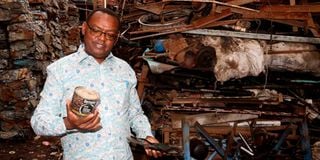Premium
State crafts tough new rules to control scrap metal trade

Kenya Union of Scrap Metal Dealers Chairman Evanson Ng'ang'a during an interview at his yard. Scrap metal dealers will have to be licensed afresh under a new regulatory framework before the state considers lifting a ban on the trade.
Scrap metal dealers will have to be licensed afresh under a new regulatory framework before the state considers lifting a ban on the trade.
A meeting between the heads of various government agencies and representatives of scrap metal dealers Wednesday failed to unlock a moratorium placed in January by President Uhuru Kenyatta on the trade that has been widely blamed for vandalism of critical infrastructure.
The government has, instead, slapped the dealers with a tough set of regulations, which it insists must be adhered to before a recommendation is made to the President on whether or not to lift the ban.
All dealers must seek fresh licences and register with a business organisation that will operate on a model similar to matatu saccos. These will, in the end, create self-regulation.
Annual fees
Licensed dealers, millers and smelters will pay Sh250,000 in annual fees, agents will part with Sh150,000, while Jua Kali ‘collectors’ will pay Sh50,000. This is on top of the existing county licenses they must secure.
Dealers will be required to prominently display the name and license number outside their facilities and keep receipts of all scrap metal purchases or sales.
The receipts shall include the registration details of the vehicles and drivers who deliver or off-take scrap metal from the business.
Dealers will have to carry with them a copy of their licenses while moving scrap metal and obtain a letter authorising the transportation of the cargo.
The letter will include details like the source of the metals, destination, type, quantity and details of the driver including their contacts.
Protect critical infrastructure
“We are not going to allow the sector to continue operating haphazardly,” said Interior Cabinet Secretary Fred Matiang’i, who chaired the meeting.
“We are not building infrastructure for scrap metal vandals. The scrap metal business would rather die to protect our critical infrastructure,” he added.
The Scrap Metal Act was signed in 2015 but is yet to take effect due to lack of regulations to govern the trade. As a result, most dealers are not licensed.
This has given room for criminals to vandalise critical state infrastructure like roads, bridges, railways and electricity transmission lines to feed the sector that was exporting 13,000 tonnes of scrap metal annually before President Kenyatta pulled the plug in January.
Despite the exports, Kenya has only 20 licensed scrap metal dealers out of an estimated 3,900. So far, only 91 traders have applied to be licensed according to Trade CS Betty Maina who was grilled by parliament on Monday.





